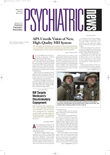Representatives of the Massachusetts Psychiatric Society (MPS) and state officials approached the divisive task of cutting the Medicaid budget with a spirit of good will and a commitment to patient needs.
The most recent payoff is the decision by the state’s Division of Medical Assistance and Department of Mental Health to accept principles for drug formularies developed by MPS (
see box).
MPS President Elizabeth Childs, M.D., told Psychiatric News, “In light of the state’s budget crisis, it seemed naïve and counterproductive to take a position that psychotropic drugs should be unaffected by the establishment of a preferred drug list [PDL].”
Instead, she said, members are directing their energy to the challenge of designing the “fairest, most clinically conscientious, evidence-based list possible.”
In a letter to MPS members, President-elect James M. Ellison, M.D., one of four MPS representatives on the state’s Psychopharmacology Work Group, described other indications of progress that resulted from involvement with the work group.
They include delay of implementation of the PDL until further consideration is given to addressing potential hazards, significant widening of the options for drug choice, considerable simplification of the prior-authorization and appeal processes, and acceptance of the notion that a psychiatrist must be involved in reviewing rejected requests.
As members of the work group, Ellison and other MPS members also helped develop an educational effort to change prescribing patterns that are costly, but whose validity is not supported by a review of the clinical literature (Psychiatric News, October 18, 2002).
The three practices are routine and concomitant use of more than one atypical antipsychotic for more than a reasonable crossover period (60 days), use of two selective serotonin reuptake inhibitors (SSRIs) for more than 60 days, and concomitant use of five or more psychotropic medications.
The work group found that as of January 2002, more than 2,200 adults received more than one atypical antipsychotic at a time for more than 60 days, at a cost of $24 million; that almost 5,000 Medicaid recipients were taking more than one SSRI for more than 60 days, at a cost of more than $4.5 million; and that more than 1,100 MassHealth recipients were receiving five or more psychiatric medications in January, often from multiple prescribers. (MassHealth covers recipients of Medicaid and of benefits from the Children’s State Health Insurance Program.)
State officials sent a letter and supporting materials in June to members of MPS and other psychiatrists as a first step to educate them about the lack of clinical evidence for the prescribing practices identified by the work group and to notify the psychiatrists about the threat to Medicaid posed by rising pharmaceutical costs.
In August they sent a second letter to 75 psychiatrists whom they had identified as the most frequent users of the three prescribing patterns. They notified them of their status and said the prescribing patterns would be analyzed again in the fall.
Annette Hanson, M.D., medical director of the Massachusetts Division of Medical Assistance, told Psychiatric News that her staff had analyzed data about the savings generated by the program up to this past January.
“The big savings were in the reduction of the number of patients who were taking five or more psychotropic medications at one time,” she said.
The number went from 559 in January 2002 to 25 in January 2003. The cost went from $305,000 a month for the first group to $20,000 a month for the second group.
Savings were also generated by a reduction in the number of patients who received more than one atypical antipsychotic at a time for more than 60 days. The number went from 481 to 399, and the cost was reduced from $310,000 to $225,000 per month.
Hanson emphasized the importance of advocating for clinical expertise in state Medicaid offices.
“Almost no states have well-funded clinical departments to develop and advise on Medicaid policies, but patients and the health care community at large need medical accountability from state officials,” she said.
That accountability is particularly important because psychotropic medications account for a large segment of the Medicaid prescription drug budget, which is a key driver of increasing Medicaid costs.
Medicaid pharmacy expenditures for the state’s Medicaid population of 940,000 reached $950 million in Fiscal 2002. Forty-seven percent of that figure was spent on medications considered to be primarily psychotropic.
“Mental health expenditures account for about 10 percent of the state Medicaid budget,” said Hanson, “but psychotropic medications account for nearly one-half of the Medicaid prescription drug budget.” ▪
